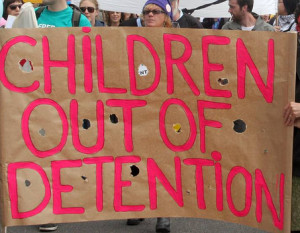
by Jordana Horn
Stop Arguing About Holocaust Analogies and Do Something
 Please, let’s not lightly throw around Holocaust analogies – but perhaps equally important, let’s not argue about whether or not we need to throw around the Holocaust analogies. The Trump Administration’s “zero tolerance” policy which has led to internment camps for children is truly horrifying. On this point, thankfully, many, many people seem to be in agreement.
Please, let’s not lightly throw around Holocaust analogies – but perhaps equally important, let’s not argue about whether or not we need to throw around the Holocaust analogies. The Trump Administration’s “zero tolerance” policy which has led to internment camps for children is truly horrifying. On this point, thankfully, many, many people seem to be in agreement.
But are they “concentration camps” “just like the Nazis had for the Jews”?
So much digital energy has been expended on dissecting this analogy on social media – “Auschwitz wasn’t a concentration camp, it was a death camp where people were systematically murdered,” etc. etc. – that it feels as though the outrage is going in the wrong direction. It’s when the posts over whether Holocaust analogies are appropriate start to rack up momentum and numbers that you start to wonder: what exactly are we doing here? Why am I up in my bathroom past 11 explaining the differences between Treblinka and Mauthausen?
“It’s not inflammatory language when the comparisons are apt,” some argue. “It’s overdoing it,” counter others. Let’s be honest: Doesn’t the simple fact of even spending time arguing over semantic gymnastics seem pedantic, obnoxious and/or even offensive when we hear the cries of children separated from their parents?
As JTA’s Andrew Silow-Carroll wrote: “Responsible Jewish groups guard against loose Holocaust analogies not because they want to claim all the world’s suffering for themselves, but because they believe distinctions matter. And they fear that if you can prove that something isn’t Nazism, then hey, it might not be all bad. But as [Ijeoma] Oluo [Tweeted], ‘We don’t actually have to invoke the deep trauma of Jewish people in order to point out that separating families is wrong and putting people in cages is wrong. It is outrageous on its own. It should be enough to force us into action on its own.’”(In response, meanwhile, some descendants of Holocaust survivors and experts have said go ahead and use the analogy.)
The salient point here is that the Trump/Sessions “zero tolerance” policy offends us to the very core of our humanity––as Jews, as women, as parents, but most importantly as people. It offers zero tolerance to the very nucleus of what makes us human.
We need to be aware of the past, because as Santayana would have it, those of us who forget the past are doomed to repeat it. But of course, an argument between those who don’t forget about how this is and isn’t precisely like what we aren’t forgetting doesn’t really prevent things from repeating, either. It’s right up there with having an argument on social media about whether posting something on social media really constitutes action or if it is just posting something on social media: it’s a spinning of wheels in order to do nothing but stand still.
As Jews, we are saddled with the knowledge that, in every generation, someone has risen up to attempt to destroy us; yet we live. If we are the chosen people, then let us be chosen not only to keep the Torah, but also to remind the world of its conscience, our deep empathy for others rooted in our own personal history.
The views and opinions expressed in this article are the author’s own and do not necessarily reflect those of Lilith Magazine